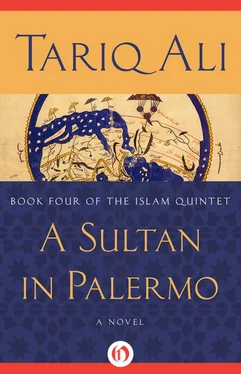‘Should we inform the Amir of Siracusa? You will be staying in the palace?’
‘I would rather not stay with him. If we decide not to inform him, will he discover my presence?’
‘I think he will and, given his temperament, will regard it as an unfriendly act. He might even think the Sultan has despatched you to look for a new Amir. The fragility of the situation should not be underestimated.’
Idrisi eyed his steward appreciatively. Ibn Fityan had been in his service for nearly twenty years, a gift from the Sultan. It was difficult to guess how old he was, but he was probably somewhere between fifty and sixty years of age. His hair had only just begun to turn grey and his dark-complexioned skin was smooth as satin. At first, Idrisi had assumed that he had been placed in his household to keep the Sultan informed of his favourite scholar’s activities. But he had been wrong. The man was part of the Chief Eunuch’s network and this was a group whose loyalty was to the faith into which they had been converted.
The Prophet had forbidden the castration of Believers, no matter what the circumstances. It was the Byzantine Court in Constantinople that had authorised a loosely regulated trade in castrated boys, supplied to the Pope and his Church for a variety of purposes, but mainly to serve in the choir. For the rest, they were sold in the open market in Palermo, the largest centre of trade between East and West, as well as Baghdad and Qurtuba. The Sultans and Amirs had special need of them. They were the trusted guards of the harem and, as such, acquired key positions in the palaces because of their unlimited access to their rulers. Often they worked closely with those who, like them, had been bought at a young age, but unlike them, had not been nipped in the bud. Philip al-Mahdia was one such person. And there soon developed between him and the circle of eunuchs a natural affinity, which meant that he always possessed alternative means of knowledge. He was not exclusively dependent on the information available to the Diwan. So close was he to the eunuchs that his enemies at Court spread the rumour that he was one himself.
Unlike others who had started life as young slaves in the palace, Ibn Fityan was not fair-skinned. Sold in Palermo at the age of two, his origins were a mystery even to himself. Despite the fact that he was not castrated, the eunuchs had adopted him. He had been circumcised and brought up as a Believer. He never talked about his wife or children. All attempts to extract information on this subject were politely, but firmly, repelled and had it not been for the indiscretion of the Chief Eunuch, Idrisi might never have known that Ibn Fityan’s son had died in the recent war to re-take Mahdia.
Idrisi was no longer surprised by the intuitive political skills displayed by his retainer. His natural intelligence appeared limitless, and his experience and knowledge of the Diwan and the palace enabled him to be one step ahead of most of the courtiers. ‘Tell me,’ Idrisi asked him, ‘how you will inform the Amir that I am on my way. To take him by surprise is surely inadvisable. That too might be misinterpreted.’
‘It is not a problem, master. Tonight I will instruct the Keeper of the Watchtower in Palermo to send a message along the coast to Siracusa. You are aware, of course, that for secret messages we use a code that is known to only the most trusted of our people. The Amir will be informed of your arrival as he takes his breakfast tomorrow morning. That will give him enough time to prepare your reception.’
‘Do you have a friend in that palace as well?’
‘More than one.’
‘Is there anything I need to know?’
Ibn Fityan sighed. ‘The Amir is a devout ruler, but many in the city see him as someone who has sold himself to the Franks in order to stay in power. He knows that this is how he is perceived and it angers and upsets him.’
‘In that case,’ muttered Idrisi, ‘we share a great deal in common.’
‘With respect, master, that is not the case. You are a scholar. He is a ruler.’
‘True, but we both serve Rujari. He with his sword and I with my pen.’
‘The men who matter know full well that your heart is with us and when the time comes, so will the multitude. We are not sure of the Amir. He does not speak much. He has only one wife and no concubines, thus restricting our ability to find out what he is really thinking. Your visit will offer the first real opportunity. The question that we need answered is this: after Rujari’s death, if we need to fight a war against the Nazarenes, will the Amir of Siracusa fight with or against us?’
Idrisi burst out laughing to conceal his anxiety. ‘Why should he trust me?’
‘That is a risk you will have to take. Was the master aware that the only wife of the Amir is the younger sister of the Lady Mayya?’
As Idrisi gasped in disbelief, he noticed the tiniest trace of a smile appear on Ibn Fityan’s face as the man bowed and left the room.
The Amir of Siracusa organises a dinner at which there is open talk of rebellion.
JUST AS THE SHIP, taking advantage of an unexpected breeze, neared the bay of Siracusa, the light of the full moon fell on the darkness of the sea in the shape of a golden meadow. However many times he had seen this and in however many different waters, it was always breathtaking. As he watched, he saw the fishermen’s candle-lit boats moving out to sea for a night’s work.
As a child he had loved being woken at dawn to accompany the household servants to the fishing village closest to their home. The journey on horseback woke him up properly; half-excited and half-frightened by the thought of seeing a jaguar crossing their path, but he never did. The real delight was observing the fish being brought off the boats by the fishermen. Then the cook would ask him, ‘Which one should we buy?’ and he would point to the largest, which made the cook laugh. ‘The big ones have too many bones. Let’s take four of these…’
Since they had left Palermo, the most important person on board had ignored all attempts to flatter and please him. His manservant had tended to his needs and kept the other travellers, mainly traders, at a distance. This was the disadvantage of being known as an intimate of the Sultan. Throughout the journey he had avoided looking at the familiar coastline that he had mapped more than once. Instead his gaze remained directed at the sea, which had, thank Allah, remained calm as he reflected on the past and the future.
After having lived for countless years in the desert wildernesses of Arabia, he thought, my forebears were astonished by the unlooked-for prospects that greeted them in urban civilisations. They could not stay still and happily swallowed the best that the new civilisations had to offer them. The darkness of the desert was no longer visible, but they surprised the world with their learning and the opulence of their courts and bazaars. But the contrast between what they had once been and what they had become meant they could not build a lasting structure on these new foundations. Thus the waves of rebellion that arose from the deserts and the mountains ranges of the maghreb, rebels with long beards belonging to sects that preached the virtues of purity and abstinence, men who came on horseback with raised swords, screaming ‘Allah Akbar’ destroyed the cities that had been so carefully built by the first wave of Believers. The puritans burnt books of learning, outlawed philosophical discourse, punished scholars and poets, thus beginning the process that would allow the enemy to enter through the pores of our weaknesses and destroy everything. They did all this for noble motives. They genuinely believed they were acting on behalf of Allah and his Prophet. Naturally, they did not see themselves as a monstrous aberration: that was how they regarded the heretics and softheaded Sultans they slaughtered together with the soldiers who defended them.
Читать дальше












